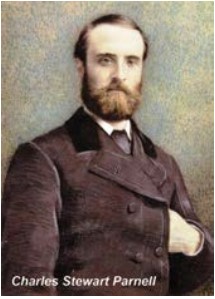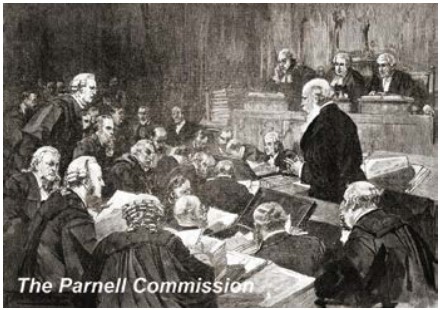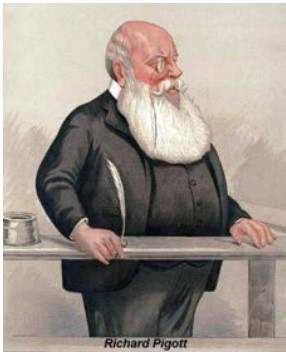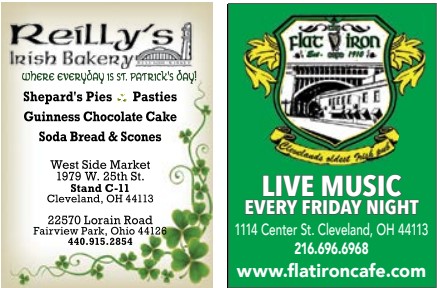The Parnell Commission
Charles Stewart Parnell was first elected to parliament in the Meath by-election of April 1875. He joined the Home Rule Party. Parnell was only 29 when he entered parliament.
There he found that he could give vent to his nationalist feelings by obstructing the work of the House of Commons. They did this by making extremely long and boring speeches on any matter which came before the House.
The obstructionists attracted support in Ireland and in Fenian circles.
Irish National Land League
On October 21, 1879, Michael Davitt founded the Irish National Land League in Dublin, with Parnell as president. The main objectives of the League were to provide tenants with a fair rent, fixed tenure on the land, and free sale. The Land League became a hugely popular movement overnight. It taught Irish farmers to stand on their own feet and assert their rights.
Meanwhile, the Conservative and Unionist members in Parliament and the government continued to search for evidence that Parnell either approved, advocated, or condoned violence and revolution to achieve the goals of the Land League. Parnell continued to be an advocate of nonviolence to achieve the Land League goals.
Phoenix Park Murders
The Phoenix Park Murders were the fatal stabbings of Lord Frederick Cavendish and Thomas Henry Burke in Phoenix Park, Dublin, on May 6, 1882.
 Cavendish was the newly appointed Chief Secretary for Ireland. Burke was the Under-Secretary, the most senior Irish civil servant.
Cavendish was the newly appointed Chief Secretary for Ireland. Burke was the Under-Secretary, the most senior Irish civil servant.
The assassination was carried out by nine members of a republican organization known as the Irish National Invincibles, a more radical breakaway group from the Irish Republican Brotherhood. The intended target was Thomas Burke, because he had been working for the Dublin Castle administration as head of the Civil Service for many years and was a supporter of the Irish Coercion Acts during the Land War. Irish nationalists referred to Burke as the “Castle rat.”
Cavendish had only been appointed Chief Secretary to Ireland the day before, and was likely unknown to the killers. His murder was due to being in the wrong place at the wrong time. The brutal murders were condemned in both the Irish and British press and by politicians of both countries.
Parnell made a speech condemning the murders, increasing his already huge popularity in Britain and Ireland. He had just enacted land reforms four days before the murders. Parnell’s reputation increased in Ireland, being seen as a more moderate reformer who would never excuse such tactics. Due to his popularity, he became known as the “Uncrowned King of Ireland.”

The investigation into the murders began immediately. Many suspects were arrested and questioned. The leader of the Invincibles, James Carey, along with members Michael Kavanagh and Joe Hanlon, agreed to testify against the others.
Joseph Brady, Michael Fagan, Thomas Caffrey, Dan Curley, and Tim Kelly were found guilty of the murders, and were hanged at Kilmainham Jail in Dublin between May 14 and June 9, 1883. Others were convicted as accessories to the crime and were sentenced to serve long prison terms.
Five years later, in March 1887, The Times of London published a series of articles titled, “Parnellism and Crime,” in which Parnell and other Home Rule Party leaders were accused of being involved in murder and outrage during the land war.
The Times also produced several letters, allegedly bearing Parnell’s signature. In one of the letters, Parnell had excused and condoned the 1882 murders of Burke and Cavendish in Phoenix Park. The newspaper had paid £1,780 for a letter supposedly written by Parnell to Patrick Egan, a Fenian activist, that included the quote: “Though I regret the accident of Lord F Cavendish’s death, I cannot refuse to admit that Burke got no more than his deserts,” and was signed “Yours very truly, Charles S. Parnell.”

Thus, it appeared clear that Parnell had approved of the Phoenix Park murders. On the day the letter was published (April 18, 1887), Parnell described the letter in the House of Commons as “a villainous and barefaced forgery.”
The Times had purchased the incriminating letters from Richard Pigott, an Irish journalist who, prior to 1884, had been a zealous nationalist and publisher of a nationalist newspaper. One 1904 source said of Pigott, “He exuded lies at every pore and had as bad a record as any man alive for treachery and falsehood. While ostensibly a Fenian conducting a Fenian organ (newspaper), he trafficked in the secrets of the organization with the Castle.”
In response to The Times articles, the government set up a tribunal to investigate the charges made against Parnell and the Home Rule party.
The Parnell Commission, officially known as the Special Commission on Parnellism and Crime, was a judicial inquiry by Parliament and the British government into allegations of crimes by Irish Member of Parliament Charles Stewart Parnell, other members of the Home Rule Party, and the Land League.
The three-judge commission sat for 128 days between September 1888 and November 1889, overseen by three judges. Not less than 450 witnesses answered almost 100,000 questions during the proceedings that lasted 14 months. The evidence examined and the testimony received filled thirty-five volumes.
In February 1889, under a two-day blistering cross-examination by Parnell’s defense attorney, Sir Charles Russell, Pigott admitted to forging all of The Times letters in an effort to destroy Parnell’s career.
This completely vindicated Parnell and the others of any wrongdoing, much to the disappointment of the Conservatives and the Prime Minister, Lord Salisbury. After admitting to the forgeries, Pigott fled to Spain and committed suicide in a Madrid hotel room as detectives were about to arrest him.
Sir Charles Russell (1832-1900) went on to become the first Catholic Lord Chief Justice of England since the Reformation. After the commission was disbanded, Parnell sued The Times for libel and defamation. The case was settled out of court, and Parnell’s name was fully cleared. Parnell accepted £5,000 in damages. While this was less than the £100,000 he sought, the legal costs for The Times brought its overall costs to £200,000. The Times was almost wiped out by the disgrace.
When Parnell re-entered Parliament after he was vindicated, he received a standing ovation from his fellow MPs.




